| > cMusicWeb.com > Modern Rock > Third Day > On The Wire With Brad Avery |
|

|
|
|||
|
|
|
|
|
|
THEMUSIC
|
|||
|
|
|||
|
|
|||
|
CURRENTS
|
|||
|
|
|||
|
|
|||
|
SEARCH
|
|||
|
|||
|
|
|||
|
cMUSICMAIL
|
|||
|
|||
|
|
|||
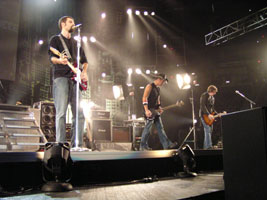 cMusicWeb.com: I read on the 3D message boards where Tai wrote, "You know what, I think he's calling us all out. With our record, and in our upcoming concerts and interviews, we want to create art that challenges us all to think about what Jesus did for us." That was written just after Wire was released and he was responding to a lot of criticism. Is this still the heart of Third Day?
cMusicWeb.com: I read on the 3D message boards where Tai wrote, "You know what, I think he's calling us all out. With our record, and in our upcoming concerts and interviews, we want to create art that challenges us all to think about what Jesus did for us." That was written just after Wire was released and he was responding to a lot of criticism. Is this still the heart of Third Day?Brad Avery: We have had time since then to see what God had in store for us with this record. It has been a challenge for us to be a little dangerous and step out of our comfort zones and to do things even different for us than we have done in the past. So I think we have been called out. It is one of those things where we have had all these opportunities that we have allowed ourselves to take advantage of, but [we have] also put ourselves in some situations that have not been the norm for us. And we have the opportunity to be bold and to represent Christ and to represent our industry.
They have all been good experiences, they really have. Even though we were worried about some of them and how they would turn out. When it came down to it, we felt that it was exactly what we were supposed to do regardless of how uncomfortable [we felt]. Or even thinking of the dangers of how they might perceive us, or what they might think of, or how they may make us look when it comes to the national media.
Yes, we have been called out and I think [that] hopefully we rose to the challenge when it came down to it. And probably we will continue to do that sort of thing where we step out of our comfort zones.
cMW: Name a certain situation that you are thinking of that God had brought you into?
Brad: How about just politics in general? We have never messed with politics. We have kind of taken the Billy Graham model where we have kind of been all things to all people — not really chosen a side. We have stayed away from that because we understand people have different opinions just like we do, and when you have aligned yourselves with one specific opinion, you have alienated others. We really have steered clear of anything that might be divisive and politics would be one of those things.
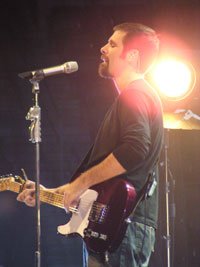 But we really felt like God was asking us to stand on the side of our President and to be a positive voice for him — to stand up for him because there really are not many other bands out there who are gong to do that. There is no rock band that would stand up for him. We felt it was something that God was calling us to do. It is certainly not a comfortable situation for us. [It is] certainly one that could be divisive and could alienate even our fans. But it was something that nonetheless that God was asking us to do.
But we really felt like God was asking us to stand on the side of our President and to be a positive voice for him — to stand up for him because there really are not many other bands out there who are gong to do that. There is no rock band that would stand up for him. We felt it was something that God was calling us to do. It is certainly not a comfortable situation for us. [It is] certainly one that could be divisive and could alienate even our fans. But it was something that nonetheless that God was asking us to do.cMW: You participated in MTV's Choose Or Lose campaign.
Brad: And we also did the Republican National Convention at Madison Square Garden, and then a Bush rally.
cMW: Right. I was at a concert in the summer where the band encouraged the audience to vote, or register to vote, without stating a particular political party. Then a month later you played at the Republican National Convention.
Brad: It was not one of those things where we said, "You need to vote for George W. Bush." And I don't believe we ever said that. Obviously I think people know where we aligned ourselves, and our views when it came down to it from a general perspective. But in reality we were encouraging people to get out and make their voices heard. And it is part of the concept of Wire — of not being safe. It is about getting out there and being a little dangerous.
I think the thing that we have seen is that a lot of times because the mainstream media is so aggressive in the way that they maybe attack Christians or how liberal they seem to be [that as a result] Christians feel like their voices are marginalized. And instead of stepping up to the challenge, they end up retreating. I think the church has retreated to the four walls and [to] find protection within the church. And what happens is that culture declines because we are not being the salt that is supposed to preserve our culture out there.
 We have kind of stayed away from culture and culture continues to decline. And it is really our job. We are salt. We are the preservative. We are supposed to be out there preserving culture and making it taste better. So that was really our issue and our challenge. If you don't make your voice heard — the only way you can really do that it seems these days is by voting. And so that is what we were encouraging people to do.
We have kind of stayed away from culture and culture continues to decline. And it is really our job. We are salt. We are the preservative. We are supposed to be out there preserving culture and making it taste better. So that was really our issue and our challenge. If you don't make your voice heard — the only way you can really do that it seems these days is by voting. And so that is what we were encouraging people to do.cMW: If one looks at the overall picture of Third Day music. Wire fits in musically and lyrically. Yet many people criticized the album. Do you think the criticism was more about the lyrics or the music?
Brad: That is kind of a loaded question because again you would pick a side and you have all these people pointing from the other side. When it comes down to it, we are obviously pretty passionate about what we are talking about — our faith and the hope that we have. And so that fuels everything we do, and it fuels the type of music that we create. For us, the passion that we have for music is again fueled by that, and so it is really hard to answer and say that one drove the other.
We are always in the throes and in the hunt to create the best music that we can possibly create. But we are not going to sacrifice the message in any stretch, and we are not going to sacrifice music for something that we want to say. We don't want it to be contrived. We do not want it to sound cheesy. We want it all to be awesome because we are creating art for the world and we think our art stands up with anybody's art out there. And we have a message for the world also and it is one that the world needs to hear.
We do not want to handicap ourselves by saying it is about the message so the music doesn't really matter. And if the music is no good, then who is going to listen to it in the first place. It is certainly having a passion for both. We do not want to then say it is all about the music and then have our music out there and say absolutely nothing that carries any weight. It is a strong balance between the both of them.
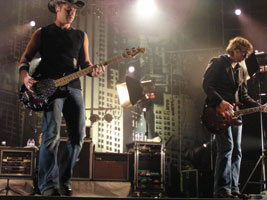 cMW: Is there anything you can tell us about the next CD? Will it be back to worship? More rock? Less rock?
cMW: Is there anything you can tell us about the next CD? Will it be back to worship? More rock? Less rock?Brad: When it comes down to it, we don't try to contrive what comes out. When we write songs, it is usually just what is coming out and that is what we deliver to people. We have talked about the record and obviously making the record and we have songs that we have written and will continue to write. And just what comes out comes out. And as we formulate those songs and we record — when we end up recording we will probably end up with like thirty songs to pick from and we will record fifteen of them or something like that. And then we will choose the ones that seem to be the best and blend together the best and seem to be where our hearts are.
We are not the kind of band that goes, "Oh we have this concept that we want to write about, so let's try to write an album that is themed around that." No, we just get together and we write songs. We write what is on our heart. And sometimes that has to do with what we have gone through or it has to do with what we are reading at the time. It is just what comes out. And then we analyze it after it comes out, after the songs are recorded. And we look at it and go back through it and that is when we really decide, "Ok, it looks like this is what God is saying through our music, this is the theme of where He is taking us, these are the ideas that are going on here." This is how we will center the theme as far as the record is concerned or our message to our audience.
cMW: Are these songs written throughout the year, or do you set aside a specific time to talk about them?
Brad: It really just depends. There are songs that are written throughout the year. But when it comes down to writing for an album, you end up writing more than throughout the year. You do a lot of writing and the well is tapped a little bit and you need a rest and go out you focus on playing music on the road and being with your family and resting. And then as you go through more experiences and God takes you through new places and you learn new things, then more ideas and more songs come. It is a gradual flow.
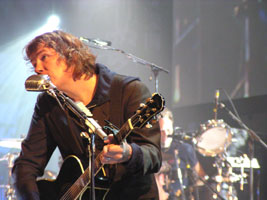 So we have been writing songs, we have songs from the past that we might revisit and obviously there will be new material.
So we have been writing songs, we have songs from the past that we might revisit and obviously there will be new material.cMW: What is different about the new Live Wire DVD in comparison to the other two Third Day DVDs?
Brad: The main thing about this DVD is that it is packaged with a Live CD. It is two products in one. I think to me it seems a little more mature than our first two projects in that the first two projects were not necessarily as much about performance. We showed some behind the scenes and then we showed the show and this is more about us just getting up and playing the music and allowing the show to happen all the way through. There is not a lot of interruption, so to speak. We have a lot of diversions in our last pieces which were good. They were all background and things like that. This is a mature piece about us playing a show. I think there is really good content. It was a special night that was captured. There are, of course, behind the scenes things but they do not happen throughout. They do not intersect the show and chop it up. It is more of the night and then those added features are elsewhere.
cMW: Third Day has been involved with Habitat for Humanity, World Vision and DATA (Debt, AIDS, Trade, Africa). Why do you suppose it is the artists going out and promoting these issues as opposed to the church?
Brad: I just think a lot of times the artists have the platform that promotes to the church. And I am not saying that is another loaded question, but we feel artists are a part of the church. We feel like we don't do this without the church. We are an extension of the church; we are a part of the body of Christ. So when it comes down to it, we are the church.
Artists do have a pretty strong platform and music is the reason. People come. They want to hear music. They want to be entertained. They want to be moved. And music has the power to do that. It is a very strong spiritual art that has a way of moving on emotions. And when you add content that is truth - when you add the Bible and when you add the words of Christ — it is like a one-two punch. It does give you the ability to kind of speak into people's lives and to challenge people to get involved in things that you are passionate about. We issue challenges for our audience like World Vision and Habitat [for Humanity].
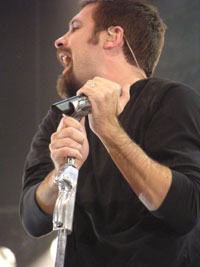 We want people to put their faith in action because worship that is just vertical stops short. Worship needs to be horizontal as we lead more people and are the hands and feet of Christ. We really want our fans to have the opportunity to do that. We issue ways to do that by aligning ourselves with organizations that we believe in, that we see doing the work of the church in different capacities. So that is the simple reason.
We want people to put their faith in action because worship that is just vertical stops short. Worship needs to be horizontal as we lead more people and are the hands and feet of Christ. We really want our fans to have the opportunity to do that. We issue ways to do that by aligning ourselves with organizations that we believe in, that we see doing the work of the church in different capacities. So that is the simple reason.cMW: What would you say to encourage a young band who is trying to decide whether to pursue a record deal or remain independent?
Brad: I think it is different for everyone. The important thing is there are some people who get together to get a record deal because they think that is where it is at. When it comes down to it, you need to first of all love each other as brothers and know that you are a small example of the church. You need to have a passion for making music, and making good music. And then what you talk about is extremely important, too. You need to be out doing it.
A lot of bands think that they will get signed and be able to go do shows and then go on tour and it actually works the opposite way. You get out there and you just do it. You go out and play shows wherever you can. You play the pizza parties and the roller rinks and the youth group functions and whatever you can do you get out there and do it. And in that capacity you have to cut your teeth and you learn your craft and you are being effective in the area in which you are which is where God has you. And you make a difference there and then maybe God increases your territory and you have the opportunity to do it nationally and maybe internationally.
So it is the way you look at it and the way you attack it. And I think it is a matter of where is your heart? If you want to do it, just go do it. Do not worry about the record deal. That will happen if it is supposed to happen. Just be obedient. Go do what God has called you to do. Whether that is in your church or in your youth group or in your home — wherever.
cMW: Describe some differences in your artist rider from your first big tour until now?
Brad: I don't even think we had an artist rider on our first tour because we did not even know much about one. You don't have a whole lot of say and a whole lot of capital to play with either way when it comes to us getting a rider and to a promoter at that level. But when it comes down to it lets just talk about the buildings that we are in and the people we have on tour with us. Back then we had a bus driver, a road manager, and we had two sound guys and a light guy. And I think we also may have had a merch guy. So it was probably six guys total back then. And now there are more than fifty people who travel on the road with us besides band guys. It is night and day. When you think about what is needed for fifty people to be able to survive out on the road as far as food and showers and just the basic details. That alone right there will just get you started.
- Kim Flanders
December 2004
December 2004
Articles written by the staff.
Maintained by WebMaster Dan Ficker.
Site Design by da Man
All Material © 1999-2005 Different Media LLC
Support cMusicWeb.com
